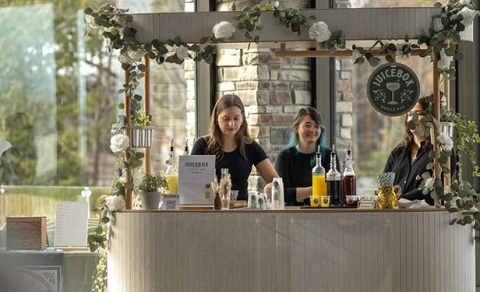Flexible F&B Enhances the Attendee Experience

Sponsored by Nth Degree Events
As macroeconomic trends push up event costs and reshape event strategies, it should come as no surprise that another event mainstay—food and beverage (F&B)—is seeing a shake-up. Instead of the traditional ritual of bringing programming to a halt for meals at fixed times, a growing number of events are offering flexible F&B, allowing attendees to eat on their own schedule.
For corporate event planners, there are real benefits to this trend—from the opportunity to offer more programming, to boosting sponsorship revenue and (perhaps most important of all) increasing attendee happiness. All of which have a positive impact on your budget.
Opportunity for more content programming
With the explosion of remote and hybrid work, much of the world has grown accustomed to more flexible schedules, including around mealtimes. Instead of stopping for lunch on an employer’s timetable, remote workers are eating what they want when they want it. This trend is changing event goers’ expectations around F&B. Instead of a large buffet or set meals at set times, attendees want the flexibility to eat on their own schedule so they can fit in food around conference activities.
For event planners, offering food anytime, anywhere creates an opportunity to extend programming throughout the day and potentially save costs on large meal planning. This in turn frees up budget to add learning tracks or speaker sessions, offer a networking lounge, or even bring in health and wellness elements such as a yoga break.
At an Outreach Unleash event in Seattle last fall, instead of fixed meals and mealtimes, attendees could choose from a wide variety of food stations scattered across the venue. A live grill station offered salmon, veggies, and risotto. An ice cream float bar highlighted locally made sodas and ice cream. Combining these stations with grab-and-go snack shacks and all-day espresso carts surprised and delighted attendees. Not only did this allow the audience to eat on their own time, it also enabled Outreach to schedule additional sessions and networking time.
Boost revenue with creative sponsorships
Also fueling the flexible F&B trend are stubbornly rising food costs. Wholesale prices for food rose an estimated 22.4% between January 2020 and January 2024, according to the government’s Producer Price Index for commodity foods. For consumers, this translates to higher costs at restaurants and hotel dining. In the corporate events sphere, rising labor costs and inventory shortages add more budget impact to already high F&B prices. For example, we’ve seen pricing on boxed lunches rise 35% from pre-pandemic (2019) costs. That’s a lot of money for a grab-and-go option that no one is particularly excited about!
For event planners, offering food and beverage options throughout the day provides numerous opportunities for creative sponsorships to offset rising costs. The possibilities are endless, from partner-sponsored coffee or acai bowl carts, Boba tea or Korean BBQ grill stations to sponsor-branded napkins and glasses. Offering the right options is all about knowing your audience and your sponsors. And the benefit to event planners who get it right is increased sponsor revenue.
Food accessibility and inclusivity makes for happier attendees
It’s not just when people want to eat that’s changing, but also what they want to eat. Consumer food needs are becoming more diverse and discerning, which is driving F&B at events to cater to a growing demand for greater diversity of cuisines and styles. This inclusivity also encompasses dietary restrictions and sensitivities to foods containing gluten, dairy, nuts, and so on. In addition, attendees care about food sustainability and, with that, environmentally friendly practices such as compostable packaging and utensils. They definitely do not want to see large amounts of leftover food thrown out.
Health-conscious attendees want brain food like salmon, avocado toast, and berries to keep their concentration levels high. On the beverage front, tastes run the gamut from mocktails to wheat grass shots to craft beers. And let’s not forget coffee, which we’ve learned attendees expect to be available all day—and I mean the good stuff, like lattes, cappuccinos, and espresso shots.
Event planners and hospitality agencies that deliver diversity and inclusivity in F&B choices are more likely to have happier attendees, which are more likely to be repeat attendees—which translates to more revenue.
Conference goers value their time now more than ever. Flexible F&B can add value to your event by enabling planners to offer more programming, increase sponsorship sales, and prioritize food inclusivity in kind-to-the-planet ways—and create a more memorable attendee experience.
Author: Rachael Casey, Associate Director, Marketing, Nth Degree Events.


Add new comment